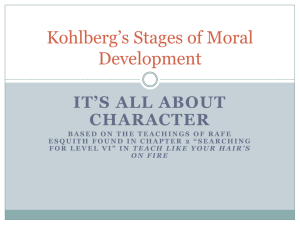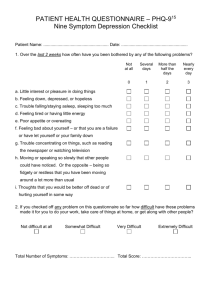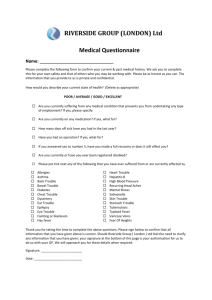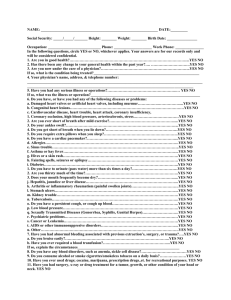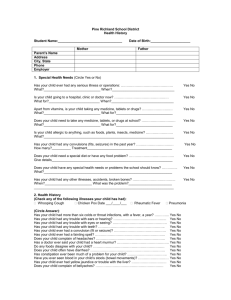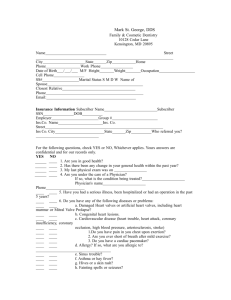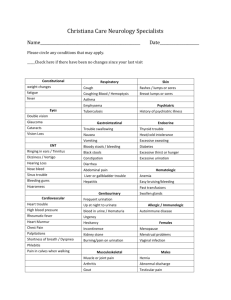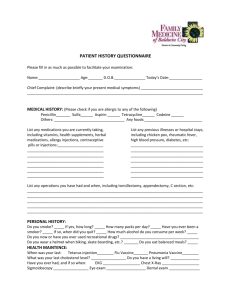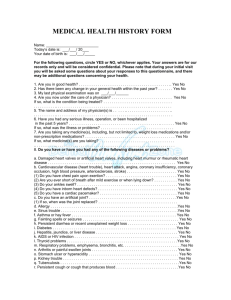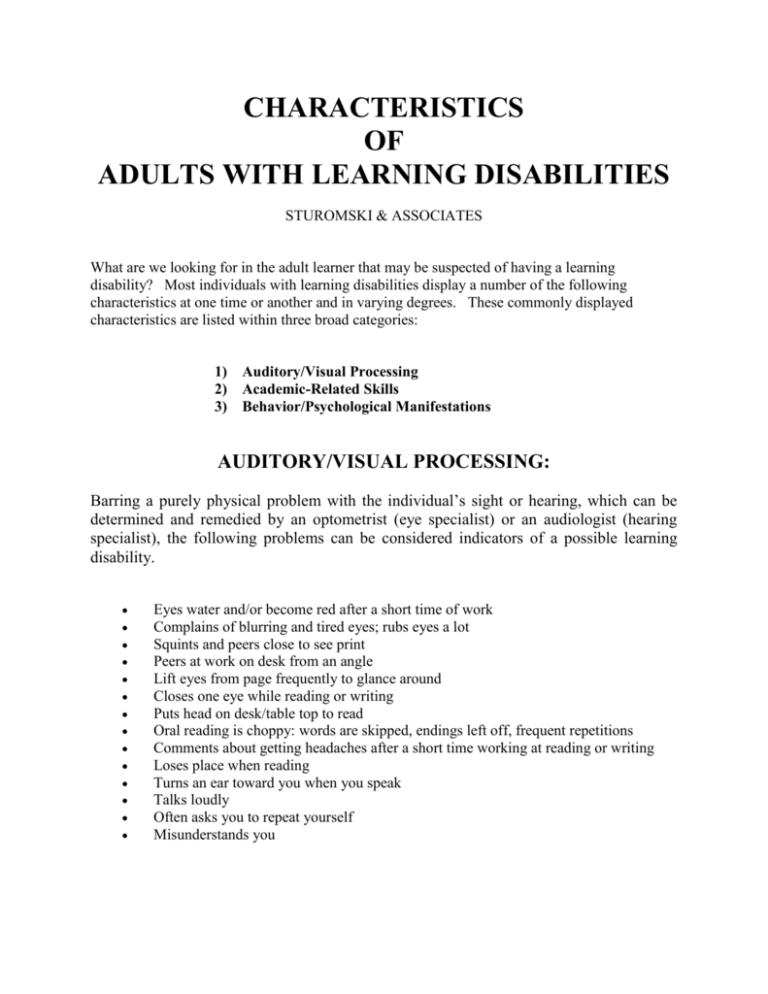
CHARACTERISTICS
OF
ADULTS WITH LEARNING DISABILITIES
STUROMSKI & ASSOCIATES
What are we looking for in the adult learner that may be suspected of having a learning
disability? Most individuals with learning disabilities display a number of the following
characteristics at one time or another and in varying degrees. These commonly displayed
characteristics are listed within three broad categories:
1)
2)
3)
Auditory/Visual Processing
Academic-Related Skills
Behavior/Psychological Manifestations
AUDITORY/VISUAL PROCESSING:
Barring a purely physical problem with the individual’s sight or hearing, which can be
determined and remedied by an optometrist (eye specialist) or an audiologist (hearing
specialist), the following problems can be considered indicators of a possible learning
disability.
Eyes water and/or become red after a short time of work
Complains of blurring and tired eyes; rubs eyes a lot
Squints and peers close to see print
Peers at work on desk from an angle
Lift eyes from page frequently to glance around
Closes one eye while reading or writing
Puts head on desk/table top to read
Oral reading is choppy: words are skipped, endings left off, frequent repetitions
Comments about getting headaches after a short time working at reading or writing
Loses place when reading
Turns an ear toward you when you speak
Talks loudly
Often asks you to repeat yourself
Misunderstands you
ACADEMICS-RELATED SKILLS
READING:
Marked difficulty in oral and silent reading
Reading patterns are slow and deliberate
Rereads lines in oral reading
May substitute, omit, add or transpose letters, words, syllables, and phrases
Difficulty reading words in isolation that can be read in paragraphs
Loses place on page
Avoids reading out loud
Reads words or syllables backwards
When reading silently, appears to be rereading or reading very slowly (poor visual
processing)
Cannot use basic phonics to sound out words
Reads with an over dependence on guessing and, as such, comprehension is
compromised
Reading style is halting and jerky
Trouble reading signs, forms, applications, want ads, etc.
Decoding problems (difficulty with sound/symbol relationships relating to
auditory/linguistic and/or visual/perceptual factors, problems discriminating
between sounds and between certain letters, i.e., b’s and d’s, p’s and q’s, reversals
of letters and numbers, and/or difficulty blending sounds together to form a word)
Difficulty with basic skills assessment
WRITTEN EXPRESSIVE LANGUAGE (Writing, Spelling, Handwriting):
Writing skills are often inconsistent with verbal abilities
Problems with grammar and syntax
Writes letters or numbers backwards or upside down
Spells words differently in the same document
Poor spelling skills
Spells phonetically, cannot remember patterns
Inconsistent memory for sentence mechanics, e.g., lack of punctuation and
capitalization
Persistent problems with sentence structure (sentences may be incomplete or syntax
may be incorrect or disassociated)
Reverses letters in spelling
Mixes capital and lower case letters inappropriately
Continuously whispers to self while writing
Writing reveals poor organization
Difficulty copying from book or chalkboard (visual memory problems)
Demonstrates simplistic writing patterns
Poor handwriting (may be sloppy, letter formation and spacing inconsistent)
Substitutes written words incorrectly
Trouble filling out applications, forms, bubble answer sheets, etc.
ORAL/VERBAL EXPRESSIVE LANGUAGE:
Forgets easily (auditory memory problems)
Slow verbal information processing
Difficulty listening
Omits or uses words inappropriately
Sentences are short and simple
Auditory sequencing problems
Problems explaining things logically
Problems organizing ideas and expressing ideas into words
Trouble expressing thoughts concisely (forgetting, confusing, or having difficulty
articulating words)
Trouble using phones
Frequently misunderstands verbal communications from others (because of auditory
discrimination problems, the learner’s brain can process the sounds in words out of
sequence, e.g. hears “aminal” instead of “animal)
Difficulty expressing information in a group setting
Trouble understanding words or concepts
Trouble retrieving known words
Difficulty selecting relevant information
Misinterprets language subtleties, e.g., tone of voice, sarcasm
MATH:
Trouble remembering math facts and procedures
Demonstrates inconsistent mastery of math facts (addition/subtraction,
multiplication/division) due to problems with long-term memory
Difficulty copying numbers and working with numbers in columns
Trouble with left/right orientation
Cannot remember in which direction to work in carrying out simple math
Confuses similar numbers or transposes numbers
Reads numbers backwards
Trouble with following sequential procedures and directions with multiple steps
Problems with math concepts in word problems
Confuses operations signs or performs operations in the wrong order
Problems with part-whole relationships
Difficulty counting money or making change
Difficulty managing money
Trouble balancing checkbook
Difficulty using a calculator
Trouble with basic skills
BEHAVIOR/PSYCHOLOGICAL MANIFESTATIONS
The following behaviors may indicate the possibility of a learning disability if observed
over a considerable period of time.
ATTENTION:
Difficulty concentrating/focusing
Short attention span (easily distracted by sounds, movement, or other visual stimuli,
unable to stay focused, difficulty in completing tasks)
Displays off-task behavior
Lack of productivity
Seemingly confused at times
Fidgets, restless, appears to be in perpetual motion
Impatient; does not wait his or her for turn
Talks excessively
Impulsive (acts/responds without thinking and without concern for consequences,
saying one thing and meaning another, blurts out answers, interrupts)
Difficulty sitting still/restless
Displays memory problems
Problems working alone
Difficulty following through/completing tasks
Verbal rambler
Doesn’t listen
Losses things
MEMORY/RECALL:
Difficulty with short-term retention, e.g., simple and multi-step instructions,
material read, information presented orally
Difficulty with long-term retention, e.g., personal history
Cannot recall familiar facts on command, yet can do so at other times
Difficulty repeating information
Problems with synthesizing discussion
Problems with sequencing events
Difficulty retaining information without excessive rehearsal and practice
REASONING/PROCESSING:
Difficulty absorbing major ideas from oral presentations (instructions, lectures,
discussions)
Information must be repeated and reviewed before understanding is achieved
Poor decision-making skills
Poor abstract reasoning skills
Poor cause/effect reasoning
Trouble recognizing and learning from mistakes
Orientation problems/difficulty with directionality: left/right, up/down, and
north/south/east/west
Takes longer to complete tasks
Delayed verbal responses
Trouble transitioning information
Need for extra practice
Difficulty dealing with maps and graphs
Difficulty telling time
Poor time management (trouble following a schedule, pacing self during tests or
meeting deadlines, seems to have a limited sense of “a few minutes”)
Arrives very early or very late
Gets lost/disoriented easily
Trouble processing written information
Problems adjusting to change
Difficulty with abstractions; need for concrete demonstration
Trouble following multiple directions, especially in a prescribed sequence
Misses portions of verbal directions
Difficulty understanding directions
Confusions in sequential order noted in such tasks as days, weeks, or months of the
year in order
Poor organization skills
Difficulty spacing assignments on a page, e.g., math problems are crowded on a
page.
HIGHER ORDER REASONING/COGNITIVE SKILLS:
Problems self-managing
Trouble organizing
Difficulty prioritizing
Problems identifying the next step
Inconsistent performance
Inconsistent transition from task to task
Trouble with associations (cause/effect)
Difficulty in selecting from alternatives
Problems in identifying main ideas/mislead by irrelevant information
Difficulty with problem-solving/decision-making skills
Poor organization of physical environment
Poor organization/management of time; unable to plan or set goals
Poor organization of concepts and tasks (including sequencing, prioritizing,
grouping or categorizing, generalizing, grasping similarities between items, relating
parts to the whole)
Unable to transfer or generalize skills or integrate information
Difficulty drawing conclusions, making inferences, dealing with abstractions, seeing
the whole
Trouble understanding the meaning of figurative language, makes literal
interpretations
Tendency to draw inappropriate conclusions due to deficient reasoning ability
SELF-CONCEPT:
Poor self-concept, feelings of inadequacy
Low self-esteem
Lacking in self reliance
Often states “I can’t” or has an excuse
Displays lack of motivation or extreme drive to complete tasks
Resistant to attempt new/difficult tasks
Indifferent to self-defeating attitudes
Unable to evaluate personal behavior
Difficulty describing personal accomplishments
Difficulty accepting criticism
SOCIAL/INTERPERSONAL:
Difficulty with social skills
Blames self for poor social skills
Noticeably out of place in group settings
Difficulty in establishing meaningful friendships
Misinterprets what others say, tone of voice, facial expressions, gestures, the
subtleties in social situations/social cues
Problems anticipating the behavior of others
Lacking in awareness of one’s personal space
Cannot work in close proximity to another
Cannot work in isolation
Withdrawn, rarely volunteers
Untidy or disorderly appearance
Most comfortable with familiar, unchanging settings
Rigid (difficulty with new people and situations); displays rigidity when routine
changes
Upsets or irritates others
Ineffective eye contact
Overly aggressive or assertive
Trouble following “the rules”
Works outside the system; often a loner
Lacks awareness of consequences
Has trouble securing assistance
Talks excessively
Uses language inappropriate to the situation
Shares intimate information inappropriately
Difficulty drawing appropriate conclusions due to poor reasoning
May, however, display excellent social interaction skills, masking other related
problems, e.g., inability to read
COORDINATION/MOTOR FUNCTIONS:
Late development of gross or fine motor skills (used in handwriting, needlework...)
Poor fine motor skills (may display speech articulation problems)
Poor motor coordination (appears clumsy or poorly coordinated, difficulty keeping
balance, exhibits poor handwriting skills, has difficulty manipulating fingers on a
keyboard, filling in bubbles on answer sheets, copying from books and off
chalkboards)
Slow reaction time
Limited physical endurance
GENERAL:
Variable or unpredictable performance
Perseveration (staying on task or using a procedure past the point of its being
appropriate)
Able to learn information presented in one way, but not in another
Severe underachievement in one or more of the basic academic areas (reading,
writing, spelling, math)
An obviously uneven profile on a battery of tests (showing real strengths and real
weaknesses)
Generally poor work and organizational habits
Seeming lack of resourcefulness
Etc.
It is important to note that many of these observed learning characteristics and behaviors
result from problems that the individual experiences in the areas of visual discrimination
and visual memory, as well as auditory discrimination and auditory memory. Visual
discrimination refers to the learner’s ability to retain a full mental image of what s/he has
seen. In both instances, the central nervous system is not processing symbols correctly.
Auditory discrimination involves the ability to recognize the differences between sounds.
Auditory memory refers to the learner’s ability to store and recall what has been heard.
The result of an auditory deficit is that the individual fails to hear vowel or soft consonant
sounds in spoken words. Auditory and visual deficits affect one’s ability to develop
and use language effectively; the effects are most apparent in reading, math, writing, and
spelling skills.
Copyright 1996 All Right Reserved - Sturomski & Associates

